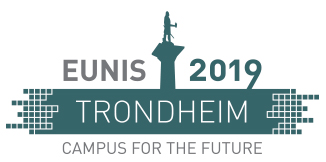Posters A0 – size will be found in the mingling area throughout the conference.
Authors will be by their poster during the exhibition/exploration breaks.
Features and tools provided by the three most commonly used systems at the top 200 universities
Darina Tothova, Juraj Fabus, Iveta Kremenova & Viktoria Fabusova
Paper #: 68 View extended abstract
Theme: Leadership & management
Subtrack: Benchmarking
Type: Poster
Abstract: The main objective is to find and compare features and tools provided by the three most commonly used systems at the top 200 universities and colleges, according to the assessment of the quality system ARWU. The main research was:
- To find the frequency of using the open source and commercial e-learning systems and determine which system has the largest ratio on the market within the top rated universities according to the evaluation system ARWU.
- To find out the use of various instruments.
- To compare features and tools provided by the three most commonly used systems at the top 200 universities.
When analyzing the use of e-learning system we relied on the information provided at the university websites. In analyse of using the e-learning systems and its parts and perception of e-learning system, we used a questionnaire survey, which was distributed between students of the selected best universities. Recent analysis was aimed to compare the three most widely used e-learning systems, where was analysed the functionality of these systems.
The most commonly used solution with a share of 45% is the Open Source solutions among which belong mainly Moodle, Sakai etc. Commercial systems present 40% from among the 200 best universities of the world and the most common representative is BlackBoard.
Introducing The Jisc Open Research Hub
Tamsin Burland, John Kaye, Dom Fripp, Paul Stokes & Tom Davey
Paper #: 40
Theme: ICT in Research
Subtrack: Opening Research Data
Type: Poster
Abstract: Our poster will introduce the newly launched Jisc Open Research Hub. This is a cloud-based service providing a community-governed solution for universities and other research institutions to manage, store, preserve and share their published research data.
Research institutions now operate in an environment which requires them to address research data management and the wider ‘open research’ agenda. Institutions must respond to mandates from publishers and research funders, as well as ensure of the security of their sensitive data and the prestige of both the institution and their researchers. Given these issues, it’s important that universities can effectively oversee and manage their digital research outputs.
Our service was developed following a consultation with the UK research sector which showed a clear demand for a national shared service. The potential economies of scale of a national service, as well a perceived lack of expertise in some smaller institutions to tackle this issue, were important factors.
Requirements were gathered from over 70 UK universities and other sector bodies. As well as economies of scale, potential users were looking for a multi-content type solution, with enhanced user experience, digital preservation, ease of reporting and community oversight. They were also keen for any service to interoperate easily with other institutional systems and scholarly communications platforms.
In response to these requirements, we have built a modular and interoperable service, offering a repository, preservation systems, reporting and long-term storage. The repository is multi-tenanted, offering significant cost savings, and allows the deposit of any content type. Based on existing open standards, the service’s open data model incorporates best practice from across the sector, including DataCite, CrossRef, CERIF, Dublin Core and PREMIS. This means the Hub can handle more than just research data, opening up many possibilities for use in responding to the open research agenda.
New Methods of Education and Their Impact on Students and Teachers
Silvia Dutkova, Iveta Kremenova, Juraj Fabus & Viktoria Fabusova
Paper #: 4 View extended abstract
Theme: Learning, Teaching & Student Experience
Subtrack: Digital Technologies & the Learner
Type: Poster
Abstract: Development of information and communication affects us in all areas of our lives. One of these areas is education specifically for example the way of education, learning methods, platforms and technologies used in education process. This article displays survey research results which are focused on using information and communication technologies in the education process at selected university in Slovakia. We obtain the data by questioning through an electronic questionnaire. The target respondents are students as well as teachers of University of Zilina in Slovakia. At the beginning of the research, we determine the assumptions that are evaluated after collecting the data. Assumptions are based on interviews with external experts and consultants for education at that university.
The main objective of this article is to find out how teachers and students respond to the implementation of information and communication technologies in the learning process, identify the user problems that may arise on both sides and the strengths and weaknesses of this implementation. This approach has proved to be a powerful tool and one of the most effective ways to get feedback from teachers and students who are directly affected by this technological development. The research results highlight the untapped potential of ICT and the need for teacher training in ICT at a given university. The results also show positive feedback from students regarding to the use of ICT in education process. Students would like to use electronic lectures as an alternative way of learning in their absence. Teachers are a bit skeptical about it.
